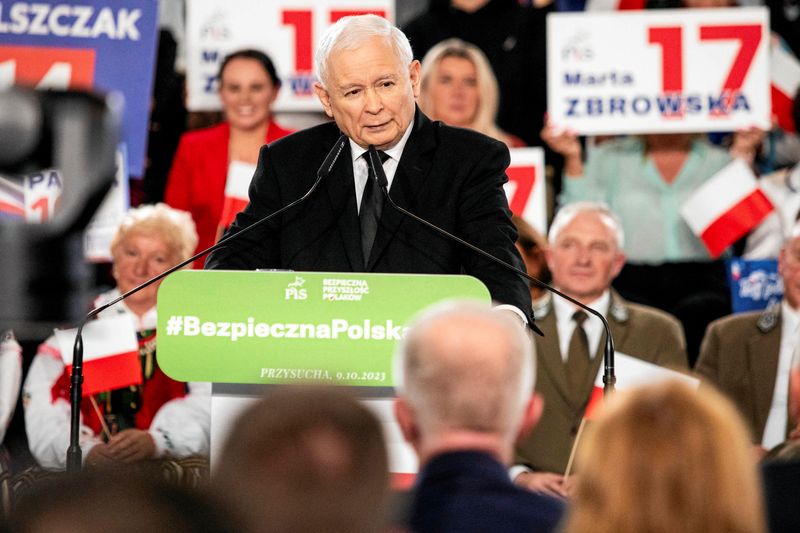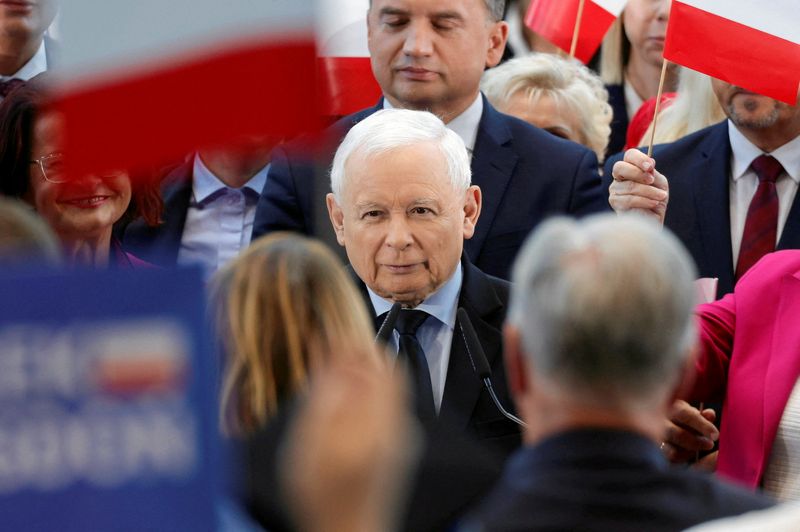By Alan Charlish
WARSAW (Reuters) - For the leader of Poland's largest opposition grouping, there was no doubt who he wanted to come face-to-face with in a televised debate ahead of a closely fought Oct. 15 parliamentary election.
"Jarek, where are you?" Donald Tusk called out during a recent campaign rally. "Where are you hiding?"
The Civic Coalition (KO) leader was addressing Jaroslaw Kaczynski, leader of the ruling nationalist Law and Justice (PiS) party. Kaczynski opted not to take part in Monday night's debate; the government sent Prime Minister Mateusz Morawiecki instead.
While on paper, Morawiecki may outrank the 74-year-old deputy prime minister, most people regard the twin brother of late president Lech Kaczynski as the man who really holds power in Poland, a European Union and NATO member.
The rivalry between Tusk, 66, and Kaczynski has been at the heart of Polish public life for a generation, while the split between the pro-European liberalism of the KO and the conservative social values and left-leaning economics of PiS has come to define Poland's polarised political landscape.
Kaczynski, who launched PiS in 2001 with his brother, and Tusk, a former European Council president, last met in a public debate in 2007. Many political observers have said that encounter was a turning point which cost PiS that election.
But with the two leaders advancing in years, the 2023 campaign is likely to mark their final showdown.
"There will no longer be such a battle between such camps, because regardless of the election result, this arrangement is over," said Anna Materska-Sosnowska, a political scientist at Warsaw University.
TRADING ACCUSATIONS OF 'EVIL'
Tusk and Kaczynski have known each other since the 1980s and were once on the same side in Poland's anti-communist opposition of that time, but their relationship is now marked by deep animosity.
"Tusk is the personification of evil in Poland," Kaczynski told supporters at an election rally in August.
"Evil rules in Poland," Tusk, a former prime minister, told supporters upon his return to Polish politics in 2021 after almost seven years away from domestic politics.
Polls show that PiS is likely to remain the largest party in parliament in the Oct. 15 election but may have to rely on the far-right Confederation party to form a government.
This would be the latest challenge for Kaczynski in a career that has seen him hold together many of the often fractious elements of Poland's religious conservative right.
For PiS lawmaker Marek Suski, without Kaczynski's presence, the right would face an uncertain future.
"If he retired, there could be some clear cracks here, which would be bad for the right wing and for Poland," he said.
Tusk is also seen by his supporters as a man who can bring Poland's diverse opposition parties together.
"At the moment he is not the bearer of one ideology, he is the leader of the entire opposition which cannot be confined to one ideology," said Bogdan Borusewicz, the deputy speaker of Poland's upper house of parliament.
INTELLIGENTSIA
Kaczynski and his twin brother, who served as president from 2005 until his death in an air disaster in 2010, grew up in Zoliborz, a Warsaw neighbourhood synonymous with Poland's educated elite.
"He is a first-rate intellectual of the old style but he has a narrow world view because he doesn't know the world," says a childhood friend who declined to be named. Kaczynski is a childless bachelor who rarely travels abroad.
Kaczynski holds Tusk responsible for his brother's death in the air crash in Smolensk, Russia, which he says was an attack facilitated by his opponent's efforts to normalise relations with Russia when he was prime minister. Opposition supporters reject this as a conspiracy theory.
For his critics, Kaczynski has spearheaded an erosion of democratic standards that brought Poland into conflict with the EU, while demonising minorities such as immigrants or the LGBT community.
However, his supporters regard him as a defender of Catholic traditions and poorer Poles.
"Jaroslaw Kaczynski has always talked about justice, that Poland should take care of all citizens fairly, and what is fair is supporting those who have limitations for various reasons, whether for health reasons or for social, economic... reasons," said Suski.
BRUSSELS
Tusk viewed the changes made in Poland by the PiS government elected in 2015 from Brussels. In his memoir of his time as European Council president, he writes of his doubts as to whether he had done the right thing by stepping away from the domestic scene.
"A persistent thought comes back and gnaws at the inside of my brain: Did I do the right thing by leaving," he said in the diary entry for the day in 2015 that PiS took power.

Since returning to Polish politics in 2021, Tusk has been subjected to intense attacks from state media portraying him as a German puppet representing the interests of an arrogant urban elite. Critics say state TV has been turned from a public service broadcaster into an outlet for government propaganda.
"He is withstanding this attack ... He is in good shape, but he is the main opponent at the moment of all the propaganda of the PiS government," said Borusewicz.
